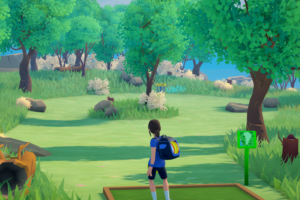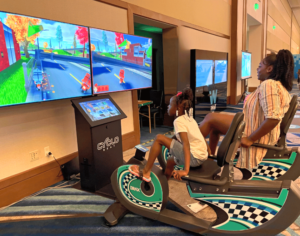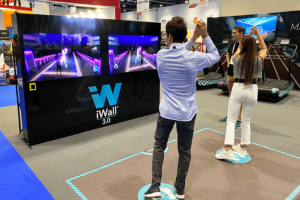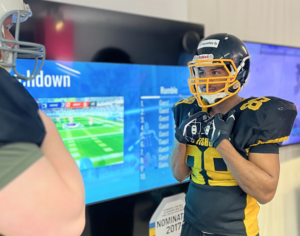“According to the Equality Act (1325/2014) and the Convention on the Rights of Persons with Disabilities ratified by Finland in 2016 (UN 2016), all kids and teens must be considered equal in all services offered by society.”
This article continues the previous blog post, which you can read here.
Daily exercise is important for everyone, especially for kids and teens with disabilities. The exercise behavior of pupils with disabilities has been published as part of the LIITU study since 2016, and the latest results from 2022 were published in March 2023. According to previous national LIITU studies, the physical activity and participation in the supervised exercise of functional limitations and disabled kids and teens have clearly been lower than for kids and teens of the same age who do not experience functional limitations or disabilities. According to the most recent research, their exercising, and hobbies have decreased more often than others during the COVID-19 pandemic.
In 2019, the Ministry of Education and Culture, Finland, published A Strategy for Leisure Activities for kids and teens, which emphasizes that kids and teens should be guaranteed the same opportunities for hobbies. There is still very little single-period and long-term research on the mobility of people with functional limitations and disabilities, which is why it has been difficult to implement sports strategic and political decisions on this topic.

Equal exercise experiences and independence
About every fourth kid and teen have some kind of functional limitation. The most experienced functional limitations were difficulties in the cognitive domain, such as remembering and concentrating. According to the LIITU study, self-reported physical activity was lower in kids with functional limitations and disabilities. According to the study, kids with functional limitations report more obstacles to exercise than kids without functional limitations. The most reported obstacle to physical activity was “School sport doesn’t inspire me” and “There are no sports facilities near my home”.
The answers emphasize the need to give disabled and functionally limited kids and teens the opportunities to move freely and in a way that suits them. With the help of exergaming, disabled and functionally limited kids and teens can be encouraged to exercise every day of the week. The positive effect of exergames on the social atmosphere also supports their participation in regular sports. For example, the exergame product iWall enables equal movement together with a friend. Exergaming products are most commonly placed in public places, such as corridors, hallways, or empty spaces. In this way, accessibility and the possibility of voluntary exercise are achieved.
According to the Guaranteed exercise survey, there are big differences between non-disabled and disabled pupils in engaging in voluntary exercise. Only a little over two-thirds (68%) of the disabled pupils and almost all (90%) of the non-disabled pupils reported that they engage in voluntary exercise. Exergaming is very easy to exercise independently, and it enables low-threshold movement, the secondary nature of competitiveness, and puts every player on the same line, regardless of functional limitations.
The LIITU study showed that the mobility of kids and teens with disabilities clearly decreased more often than others during the Corona pandemic. Also, the amount of strenuous exercise and the regularity of the activity was less for the disabled. With exergame products, even kids and teens with disabilities get excited about effective exercise throughout the school day, which helps to achieve the daily exercise recommendation. Exergaming has been shown to develop motor skills, but multiple games are also physically demanding and promote social interaction between different classes and grade levels.

Feelings of success by exergaming
According to the Guaranteed exercise survey, the fun of the exercise, the ability to generate joy and experiences of success, and the ability to make friends in a comfortable leisure activity are also important for disabled kids and teens. Every kid and teen, regardless of functional limitations, should have an equal opportunity to participate and experience the joy of movement with others.
Our exergaming product iWall can already be found in more than 50 countries and in more and more Finnish schools. iWall works entirely with a motion sensor, the player’s own body acts as the controller. Most of the games also work when played in a wheelchair, and players recognize these games by the wheelchair icon. The best thing about iWall is that anyone can really play it together with a friend and if necessary, also with assistance.
We are committed to offering equal exercise experiences. Our mission is to offer everyone entertaining exercise experiences and to create a feeling of competence. At the same time, this creates a natural desire to move, which helps to build a healthier society in the long run.
Sources:
Kokko, S. & Martin, L. (2023). Lasten ja nuorten liikuntakäyttäytyminen Suomessa. LIITU-tutkimuksen tuloksia 2022. Valtion liikuntaneuvoston julkaisu 2023:1. https://www.liikuntaneuvosto.fi/wp-content/uploads/2023/03/Lasten-ja-nuorten-liikuntakayttaytyminen-Suomessa-2022-2.pdf
Hakanen, Tiina & Myllyniemi, Sami & Salasuo, Mikko (toim.): Takuulla liikuntaa. Lasten ja nuorten vapaa-aikatutkimus 2018 erillisnäyte. Valtion liikuntaneuvoston julkaisuja 2019:5. Valtion nuorisoneuvoston julkaisuja nro 62. Nuorisotutkimus-verkoston/Nuorisotutkimusseuran verkkojulkaisuja 142. ISBN 978-952-7175-89-7. https://www.liikuntaneuvosto.fi/lausunnot-ja-julkaisut/takuulla-liikuntaa-kyselytutkimus-toimintarajoitteisten-lasten-ja-nuorten-liikunnan-harrastamisesta-ja-vapaa-ajasta/






